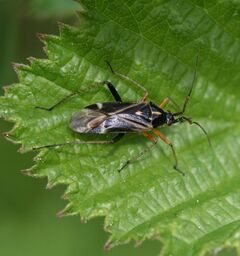Biology:Harpocera thoracica
| Harpocera thoracica | |
|---|---|

| |
| Harpocera thoracica, male | |
| Scientific classification | |
| Kingdom: | |
| Phylum: | |
| Class: | |
| Order: | |
| Suborder: | |
| Infraorder: | Cimicomomorpha
|
| Superfamily: | |
| Family: | |
| Subfamily: | |
| Genus: | |
| Species: | H. thoracica
|
| Binomial name | |
| Harpocera thoracica (Fallén, 1807)
| |
Harpocera thoracica is a species of bugs from Miridae family.
Distribution
This rather common species could be found anywhere in Europe except for the Baltic states, Canary Islands, Finland , Iceland, Malta, and Russia .[1]
Habitat
These bugs inhabit hedge rows and sunny, dry areas with oaks.[2][3]
Description
Harpocera thoracica can reach a length of about 6–6.4 millimetres (0.24–0.25 in) in males, of 6.4–6.8 millimetres (0.25–0.27 in) in females.[3][4] An evident dimorphism exists between the males and the females of this species. Males show a more elongated body, longer tibiae and a characteristic inflated 2nd antennal segment.
The basic body color of these bugs ranges from black, dark brown or orange to pale brown.[4] The tips of hemelytra are black, surrounded by white markings. Legs are yellowish-brown and antennae are brown.
The nymphs have dark hairs and thickened basal antennal segments. They are reddish or pinkish-white-coloured.[2][4]
Ecology
Adults can be found from late April or May to the middle of June at the latest and live for only one month, with females living a bit longer.[4] These zoo phytophagous bugs suck on buds, feed on pollen and on juices of oaks (Quercus robur), feed on nectar of Anthriscus sylvestris and occasionally hunt small insects, especially aphids.[3][5] After the eggs have been deposited, they remain for 10 months.[6] After the species spend their time in the egg, larvae appear. The larva development takes no more than two weeks.[4] As that time passes, nymphs appear. Males are victims of ultra-violet lights, and may be found in moth traps.[4]
References
- ↑ "Countries where the species don't inhabit". Fauna Europaea. August 29, 2013. http://www.faunaeur.org/full_results.php?id=451355. Retrieved October 13, 2013.
- ↑ 2.0 2.1 Nymph colour
- ↑ 3.0 3.1 3.2 Commanster
- ↑ 4.0 4.1 4.2 4.3 4.4 4.5 British Bugs
- ↑ Karel Hradil, Václav Psota and Pavla Štastná Species Diversity of True Bugs on Apples in Terms of Plant Protection Plant Protect. Sci. - Vol. 49, 2013, No. 2: 73–83
- ↑ Ecology
External links
| Wikimedia Commons has media related to Harpocera thoracica. |
Wikidata ☰ Q2529872 entry
 |


